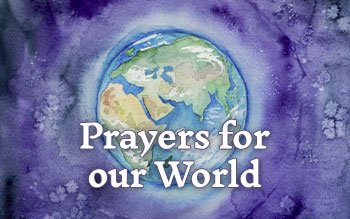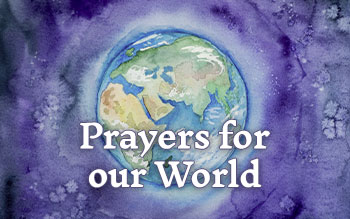Displaying items by tag: Asia
North Korea / China: sex trade trafficking
China’s president Xi Jinping visited North Korea on 20/21 June. It is the first visit by a Chinese president in over a decade. While the world ponders Korea’s denuclearisation issue, the plight of trafficked victims from North Korea to China is being ignored. Women and girls from the reclusive state are being taken to China and forced to work as prostitutes or sold as brides, and Beijing is doing little to stop it. Fleeing a patriarchal regime of tyranny and poverty, they are passed through the hands of traffickers, brokers, and criminal organisations before being pulled into China’s sex trade. Pray for sexual slavery and trafficking to be topics of conversation between Xi and Kim. Xi is also expected to attend the G20 summit in Osaka the following week. Pray for a positive meeting between him and Donad Trump there.
China: earthquakes and fracking
On 17 June buildings collapsed, trapping people underneath in a 6.0 magnitude earthquake in the south-west Chinese province of Sichuan. Thirteen people have died so far, and 4,000+ people have been relocated from damaged and destroyed homes. Landslides damaged major roads. Over 500 firefighters were deployed to the area, and rescue teams are bringing in 5,000 tents, 10,000 folding cots, and other supplies. See Earlier this year a thousand residents gathered outside government buildings in Sichuan province, blaming recent earthquakes on shale gas exploration in the area. The county subsequently suspended fracking operations. The Seismological Society of America attributed a 5.7 quake in December 2018 and a 5.3 quake in January 2019 to fracking activities in the region. Quake-prone Sichuan has extensive fracking operations, accounting for about a third of China's total shale gas production. Chinese geologists said that over-development of hydropower resources has undermined the seismic stability of Sichuan. Some blame the 2008 catastrophic earthquake on large-scale damming.
China, Hong Kong: Catholics urge restraint
A proposed bill allowing mainland China to pursue government critics and criminals in Hong Kong and extradite them to China drew protest marches by thousands on 9-11 June, causing a debate on 12 June to be cancelled. The Catholic diocese of Hong Kong joined the social welfare sector and the largest teachers’ union in voicing concerns about the bill. Two thousand counsellors, carers, therapists, and religious groups went on strike. A strike organiser said, ‘We are forced to take a stand on this moral question of right and wrong.’ Several other Christian denominations in Hong Kong also voiced concerns. Police fired rubber bullets and tear gas at protesters, who threw bricks and projectiles back. People are worried that the civil rights and freedoms guaranteed to Hong Kong under the ‘one country two systems’ arrangement will be eroded under the new law. China often uses accusations of non-political crimes to prosecute its critics.
India: Cyclone Vayu
Powerful tropical cyclones rarely make it this far north in the Arabian Sea. Gujarat has not had a strong storm make landfall in twenty years. However, the state's additional chief secretary has appealed to those in the path of tropical cyclone Vayu to remain safe and not to venture to coastal areas. ‘Each and every life is valuable for us’, he said. About six million people could be impacted by Vayu; nearly 300,000 people in northwest India have been evacuated to shelters. The cyclone is passing close to the coast, with winds of 145 km/h and gusts of 160 km/h, and a storm surge of two metres has inundated low-lying areas. Fishermen are warned not to venture out to sea. The national disaster response force has deployed 52 teams to deal with the storm’s impact.
Gulf of Oman: oil tankers attacked
Two oil tankers have been attacked off the coast of Iran. They were evacuated, and search and rescue teams from Iran saved 44 sailors. The Front Altair, carrying crude oil, is believed to have been struck by a torpedo, and later sank. The Kokuka Courageous was reportedly targeted by a magnetic mine. The incident comes amid heightened tension following an attack on four vessels near the Emirati coast on 12 May; the US accused Iran of sabotaging the vessels in an attempt to raise oil prices. All the crew were reported safe and only one minor injury reported. Al Alam TV station in Iran reports that ‘successive explosions’ took place 25 miles off the Iranian coast. White House national security adviser John Bolton has pointed the finger of blame at Iran.
East Asia Younger Leaders Gathering
220 younger leaders from China, Mongolia, Korea, Japan, Taiwan, Macau, and Hong Kong gathered from 25-28 March in South Korea, for the first-ever Lausanne East Asia Younger Leaders Gathering. Young leaders from every region of East Asia found friendship across and within dividing lines and rediscovered the power of faithful communal witness, focusing on ‘The Essence of the Gospel - Unity in Diversity’. Nearly a quarter of the world’s population live in East Asia, with its full spectrum of political, cultural, geographical, and religious diversity. Their history is fraught with longstanding animosity between nations; but Christianity in the region is full of cross-pollinating friendships. The Korean translation of the Bible was born in China and one of the first leaders of the Korean church was discipled by a Japanese Christian. Today the East Asian Church is utilising the hands and feet, ears, brain, mouth and heart, to bring the gospel to East Asia and beyond - no matter the cost.
Iraq: Displaced elderly Christians
Displacement by IS has inflicted trauma on Iraq’s Christians, particularly the elderly. Reconstruction goes on, but for elderly believers, displacement has placed them in a living coffin. Their relatives have fled the country and many are completely alone and unable easily to access the aid available to others more mobile. Sara doesn’t know her age, just the memories of at least 60 years gone by. Looking at her tattered furnishings, one would never know that until very recently, Sara’s life was completely different. She lived comfortably in a beautiful house surrounded by family. Now, sickness traps her in this small closet and her family is scattered across the world. Sara is alone, with only the Rubik’s Cube in her hands to keep her company. Her front door is slightly ajar, a signal of hope that someone will walk by and choose to pass the time with her.
Iran: Outrage forces 'correction' of kindergarten directive
Images of a controversial administrative order went viral across Iranian social media in recent days, enraging large sections of the country's religious minorities and causing widespread public outrage. Iranian authorities had to revise the official order that sought to ban religious minorities from teaching at government-run kindergartens. A Zoroastrian parliamentarian reminded the government of a paragraph in the Iranian Constitution which advises against any form of discrimination and calls for equal opportunities. He also demanded Iran ‘will no longer witness such inhumane and unethical decisions against the followers of divine religions.’ Iran's religious minorities have experienced widespread discriminatory policies and practices. In particular, Baha'is, Zoroastrians, Sunni Muslims and of course Christians.
The Staggering Rise of the Church in Iran
Robert Bruce, a Scottish missionary to Iranian Muslims in the late nineteenth century, wrote home to his supporters, “I am not reaping the harvest; I scarcely claim to be sowing the seed; I am hardly ploughing the soil; but I am gathering out the stones. That, too, is missionary work; let it be supported by loving sympathy and fervent prayer.”
For many years, Iran was one of the most difficult regions of the world to reach with the gospel. A significant development occurred in 1979, however, with the Islamic Revolution in Iran. The ruling monarch, Shah Mohammed Reza Pahlavi, was overthrown, and in his place an Islamic Republic was birthed, led by the Ayatollah Khomeini. Sharia law became the law of the land, and Muslim clerics became the heads of state.
Many in those days believed the revolution would lead to a time of flourishing in Iranian society. The new regime made great promises about rights and economic progress, as Iran was finally free from the influence of the West. The laws of man would be replaced by the laws of God, they claimed. Under the Republic, conversion to any other religion was considered apostasy and could be punished with death.
Door Opens
As we near the fortieth anniversary of the Islamic Revolution, however, we see that the prayers of many Christians over the years have been answered, and the climate in Iran is vastly different. The gospel has spread throughout the land in unprecedented fashion despite increased persecution of Christian believers. To use the words of the apostle Paul, “A wide door for effective work has opened . . . and there are many adversaries” (1 Corinthians 16:9).
As of 1979, there were about five hundred known Christians from a Muslim background in Iran. In 2005, it was estimated that there were 40,000 ethnic Iranian Christians (not including ethnic minority Christians who live in Iran). That number grew to about 175,000 Christians in 2010, according to the Joshua Project. Today, the average estimates of Christians within Iran range from 300,000 to upwards of one million, according to some missions experts. Operation World, a missions research organization, continues to list Iran as having the fastest-growing evangelical church in the world. In fact, more Iranians have become Christians in the last twenty years than in the previous 1,300 years, since Islam came to Iran.
Four Reasons for Growth
Several factors have contributed to the rapid growth of the church in Iran. Here are four of the most important.
1. Disillusionment with Islam
Since the time of the revolution, the Islamic regime, which promised much in the way of economic development and freedom, has not delivered. Rather than prosperity and growth, the economy stagnated. The people also have been oppressed — women punished for not covering their hair, and others punished for speaking out freely in protest. As a result, the country has isolated itself further from the rest of the world.
Ironically, because the Islamic Republic in Iran has tied religion and state so closely together, the people’s disappointment with the government has led to great skepticism of Islam. Consequently, Iranians have become increasingly open to hearing the Christian message.
2. Persecution
The rise of persecution against Christians in Iran has served both as a sign of the rapid growth of Christianity within the country and as fuel for further growth. In the 1990s, several key leaders of the church in Iran were killed. One of the most famous martyrs, Mehdi Dibaj, gave a defense before the Islamic courts prior to his death that has become a rallying cry for many Christians in Iran. Dibaj declared,
I would rather have the whole world against me, but know that the Almighty God is with me; be called an apostate, but know that I have the approval of the God of glory. . . .
Life for me is an opportunity to serve him, and death is a better opportunity to be with Christ. Therefore I am not only satisfied to be in prison for the honor of his Holy Name, but am ready to give my life for the sake of Jesus my Lord and enter his kingdom sooner, the place where the elect of God enter to everlasting life.
Examples like this have emboldened the church as the faithful remember the words of Jesus, “Because you are not of the world, but I chose you out of the world, therefore the world hates you” (John 15:19). In 2010, many church planters and leaders were arrested. I had the privilege of visiting with one of these faithful brothers after he served five years in prison. He recounted the moment when he received news that many of his colleagues were being arrested.
Briefly, he considered fleeing. But then he remembered the words of Jesus from John 10, that he is not the hired hand who sees the wolves coming and flees, but he is rather the good shepherd, who lays his life down for his sheep (John 10:11–12). He told me he went home knowing it would lead to his arrest, but he saw prison as an assignment by God to be a ministry post for him to reach many within prison.
This persecution has served to motivate further evangelistic zeal among Iranian Christians. These faithful servants are modern-day examples of Paul, who once wrote, “Most of the brothers, having become confident in the Lord by my imprisonment, are much more bold to speak the word without fear” (Philippians 1:14).
3. The Diaspora and Use of Media
A countless number of Iranian Christians have been scattered around the world. Many of these saints sense a unique calling to continue supporting the work of gospel advancement within Iran from the outside.
The advancement of technology through the Internet and satellite TV has made the Christian message more accessible to Iranians who may have never even met a Christian. The diaspora Christians have been active in broadcasting the gospel and Bible teaching into Iran. In the last decade, social media also has been a powerful tool to reach Iranians and teach them the truths of Scripture.
4. Bible Distribution
Although persecution has not produced the results that the Iranian authorities wanted, they have continued to work hard to stamp out the message of Christianity. The Bible (especially the New Testament) is banned literature in Iran.
But the people have been hungry for the word of God. There have been over two million New Testaments printed in recent years for dissemination in Iran, and about 180,000 entire Bibles have been distributed within the country. As Paul told Timothy, “The word of God is not bound!” (2 Timothy 2:9).
Three Ways to Pray
These are some factors that have contributed to the rapid growth of the church in Iran. But ultimately, the kingdom of Christ is spreading within Iran because God’s Spirit is moving powerfully. Though there has been great progress, the need for prayer and support continues to be great. Would you join me in praying for Iran — its people and leaders? Here are three ways you can pray for the church.
1. Courage
Although the number of house churches and believers is growing every day, the opposition continues. Iranian Christians continue to be arrested and charged with acting against national security. House churches continue to meet secretly while shifting their meeting times and locations to stay undetected. Christians continue to evangelize, knowing they are putting their lives at risk.
2. Unity
Since most of the activity of the church is done secretly, the Christians are isolated from each other. Iranian leaders are forced to work covertly and therefore apart from each other. Security concerns make collaborative efforts difficult, even among ministries outside of Iran that work within the country. All of this creates obstacles for unity.
3. Trained Leaders
The nature of the underground church is such that, many times, house-church leaders are unqualified and untrained, and sometimes, there is no pastor in the group and the gathered believers are being fed solely through satellite TV. Some of the teaching that the church absorbs is not sound theology. Iranians don’t have the same access to Christian literature and training as many believers do throughout the rest of the world. There are ministries who are already working hard to meet this need by making quality training available for leaders, and we need to pray for this work.
These words of Jesus may sum up the situation best in Iran: “The harvest is plentiful, but the laborers are few; therefore pray earnestly to the Lord of the harvest to send out laborers into his harvest” (Matthew 9:37–38). Let’s pray the Lord of the harvest continues to send his laborers throughout Iran, so that millions more Iranians find forgiveness, peace, and the hope of glory through the gospel of Jesus Christ.
Article by Afshin Ziafat, Pastor, Frisco, Texas - (@afshinziafat) is lead pastor of Providence Church in Frisco, Texas. His passion is to teach the word of God as the authority and guide for life, to preach Jesus Christ as the only Savior and Redeemer of mankind, and to proclaim the love of Christ as the greatest treasure and hope in life. He and his wife, Meredith, currently reside in Frisco with their three children.
Afghanistan: Women Activists Fear Return Of Repressions
Khalida Khorsand, a 35-year-old rights activist from the western Afghan city of Herat, is skeptical about Taliban claims that it has dispensed with its strict rules against girls' education and women working.
The militant Islamic group made the declaration in the midst of recent peace talks with U.S. envoy Zalmay Khalilzad aimed at bringing an end to the long U.S. military presence in Afghanistan.
But Khorsand still remembers the notorious repressions under Taliban rule as a teenager in the western city of Herat when she risked the death penalty to study literature in a class disguised as a women's sewing group.
"After nearly 18 years without the Taliban in power, we now see that the Taliban are coming back in Afghanistan and there haven't been big changes for women's lives -- especially in rural areas," says Khorsand, who has dedicated much of her life since 2001 to advancing women's rights in western Afghanistan.
Even without the Taliban in power in Herat, Khorsand says, many hard-fought gains for women since the collapse of the Taliban regime already are under threat.
She attributes that situation to what she calls "a Taliban way of thinking" by many Afghans and a proliferation of unregistered religious schools in Herat teaching "radical Islam" to as many as 50,000 young people.
If the Taliban gets a role in the Afghan government as part of a peace deal, as Khorsand expects, she fears a floodgate will be opened for resurgent "radical Islamists" in Herat.
"I don't know why this has been allowed to happen under the current government of Afghanistan since 2014," Khorsand laments. "They are not paying attention to the rise of fundamentalists and radical groups in Herat.
"Now the city has become a safe haven for the radical groups that support the ideology of the Taliban," Khorsand says. "The fundamentalist groups in Herat are very organized and have a lot of money. They take the young people into madrasahs and teach to them the principles of the Taliban, and they are having an enormous impact on the young generation."
Those groups already have gained backing from municipal authorities for an unofficial ban on live musical performances in Herat and for a ban on celebrating Valentine's Day -- with both practices being declared "unIslamic."
In rural areas of Herat Province, where Khorsand worked for years to help women who are victims of domestic violence, Khorsand says she has seen disturbing signs of support for the punishments doled out by the Taliban under its strict enforcement of Islamic Shari'a law -- amputating the hands of thieves, publicly flogging people for drinking alcohol, and stoning to death those who engage in adultery.
Students at Herat's madrasahs deny being radical Islamists. But they also support a return to the prohibitions and punishments of the Taliban era.
"Allah says cut off the hands of a male thief and a female thief," says Jan Agha Jami, a 21-year-old at the Fakhr al-Madares madrasah in Herat. "When men and women commit adultery, whip them if they are single. If they are married, they should be stoned, and the Koran's rulings should be implemented in public.
"Music concerts are absurd because they are forbidden," Jami tells RFE/RL. "Music is bad for the mind, memory, and even human psyche. When a girl performs in front of strangers, the whole society is corrupted."
Reflecting on the growing popularity of such beliefs in Herat, Khorsand says "it makes no difference for women in Afghanistan if the Taliban exists or doesn't exist."
"The Taliban's way of thinking about women is the way many people are thinking in Afghanistan," she says. "A lot of Afghans have traditional ways of thinking and they believe the talk of the Taliban. Unfortunately, much of their way of thinking is against the rights of women."
Move Forward, Step Back
To be sure, Khorsand says there have been important advances for Afghan women since 2001 -- including language in the Afghan Constitution that enshrines the right to education and to work.
Women are members of parliament and can be seen on television, competing in sports, and performing in concerts in Kabul.
But the Afghan government since the collapse of the Taliban regime has included many conservative Islamists and former warlords whose attitudes about women are similar to the Taliban.
Sima Simar, the head of Afghanistan's Independent Human Rights Commission, says the gains for women since 2001 can easily be overturned and have rarely been implemented in rural areas where most Afghans live.
The 2018 Women, Peace, and Security Index by Georgetown University and the Peace Research Institute of Oslo ranks Afghanistan as the second-worst place in the world to be a woman. Only Syria was ranked worse.
That study notes that only 16 percent of Afghanistan's workforce is female and that half of all Afghan women have four years or less of education.
UNICEF, the United Nations children's agency, says only half of school-aged Afghan girls now go to school, and that only one out of five girls under 15 are literate.
Nearly two out of three Afghan girls are married when they are teenagers or younger. On average, they are sent by their parents into arranged marriages between the ages of 15 and 16.
Most imprisoned Afghan women have been jailed for so-called "morality crimes," such as leaving an abusive husband or demanding to marry a man of their own choosing.
Pray: That the steady advances being made towards improving womens rights will not be overturned.
Pray: That boys and girls will get equal access to good education, especially in the rural areas.
Pray: For improved employment opportunities for women.
Pray: For those who work with and speak up for the oppressed women and children in Afghan society - that their voice will be heard and acted upon.









